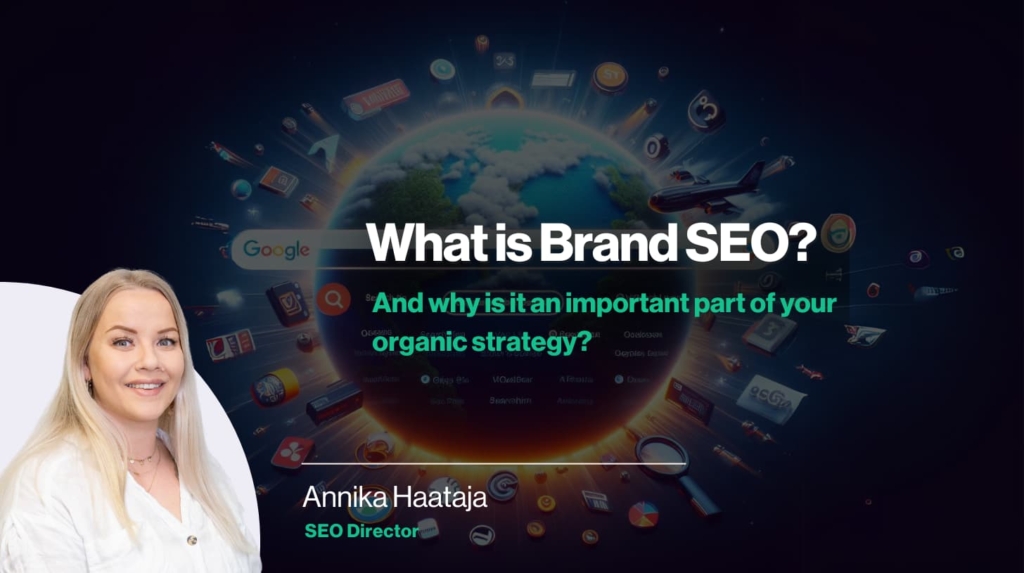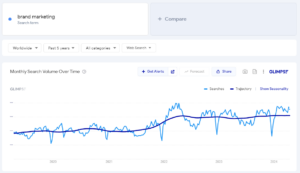
As an SEO professional, I’ve encountered numerous websites that seem to rank exceptionally well with minimal SEO effort.
At times they’ve been client sites (which is of course pretty satisfying for us as an agency!) but when it’s a competitor’s website, you’ll naturally feel frustration — along with a desire to know just how they’re doing it.
Even with superior and more comprehensive content, higher-quality links, and near-flawless technical site health, I’ve struggled to outrank these sites.
I’m sure many SEOs have had similar experiences, and will know just how disheartening this can be — honestly, it can even make you start to doubt your skills as an SEO!
But what’s the secret to the success of these sites? How are they consistently outranking those who are seemingly working harder at SEO?
Well, I can say with confidence that most of the time it’s because they have better brand SEO than your site.
Brand SEO is a concept that’s as yet quite overlooked, but it can be the differentiator between one brand that’s dominating the SERPs and another that’s struggling to gain a foothold despite seemingly doing everything right SEO-wise.
But what exactly is brand SEO? And why does it play such a crucial role in driving visibility and traffic? Let me explain.
What is Brand SEO?
Brand SEO can be defined as SEO activities that can reinforce brand signals and, in turn, support organic growth.
I created this straightforward definition to assist with understanding the concept of brand SEO. There isn’t actually an existing definition; and for us SEOs, conceptualising anything is crucial since we don’t have an existing playbook to follow. We base our strategies almost entirely on our previous experiences and what is commonly agreed upon in the industry.
So, brand SEO is all about transmitting ‘brand signals’ to search engines and web users; which means, of course, to understand brand SEO we first have to understand brand signals.
What are brand signals?
Brand signals act as cues that help search engines and users understand your brand’s core existence, i.e. purpose, trustworthiness, and value proposition to name a few.
Effectively, we want search engines to understand your brand as an entity. And when they do, they can better understand what sets you apart from the rest of the brands in your market — meaning they’re more willing (and more likely) to rank your site higher in search results.
Imagine you’re attending an SEO conference — not too much of a stretch for me, especially as a BrightonSEO devotee and speaker. If you then imagine yourself as a brand, your brand signals are all the things that convey information about you to other attendees — from what you’re wearing to the body language you display — which in turn help them gauge who you are and determine whether they trust you.
In much the same way, brand signals provide vital pieces of information about your brand to search engines and users, enabling them to build a ‘picture’ of your brand and understand what it is you’re offering, how much experience and expertise you have, and ultimately whether they deem you to be authentic and trustworthy. So closely linked to E-E-A-T!
How do brand and SEO work together?
When you think ‘brand’, this actually plays a part in many aspects of an SEO strategy — from the content we write (we need to adhere to the correct messaging and positioning) to the visual identity of our site (its UX and design), the links we earn (sites with which we don’t mind our brand having contextual associations), and our technical SEO (the quality, performance, and professionalism of our site).
Brand and SEO don’t exist in silos – in fact, they can support one another.
SEO, for instance, can enhance brand awareness through improved organic visibility – this is quite obvious right? SEO can also help brands through coherent messaging, content marketing campaigns, and brand reputation through digital PR.
But even more importantly, brand can support SEO in two ways:
- Differentiation: A strong brand stands out from the competition. Your unique messaging, value proposition, and mission statement all contribute to this differentiation, making you a more attractive choice for users and search engines alike.
- Customer Lifetime Value: Think about the brands you consistently return to for specific products or services. Trust is a key factor here. People are more likely to engage with brands they recognise and trust.
And these factors all contribute to:
- Higher click-through rates (CTR): When users recognise your brand, they’re more likely to click on your search result even if it’s not the most relevant one.
- Increased branded traffic: Once a user interacts with your brand, they might search for it directly later, leading to organic visits. This branded traffic often converts at a higher rate.
- Overall site popularity: A popular site, due to strong brand SEO, can see a boost in rankings for unbranded keywords as well. Google takes these positive signals into account and might elevate your site’s overall visibility.
The benefits extend beyond vanity metrics, though. Brand SEO also makes your life as an SEO professional easier:
- Easier link acquisition: Put simply, building links is simpler when you’re a recognised brand.
- Enhanced E-E-A-T signals: Establishing yourself as an authoritative and trustworthy brand strengthens your E-E-A-T (Expertise, Experience, Authoritativeness, and Trustworthiness) signals, a crucial SEO factor.
- Streamlined content creation: Brand guidelines provide a clear direction for content creation, saving you time and effort.
Even Google mentions brand reputation several times in their Search Rater Quality Guidelines.
And it’s no surprise — SERPs are getting busier and busier each day, with new SERP features constantly being pushed out to consumers. In short, this means that without solid brand SEO it’s increasingly difficult to stand out.
Why is brand SEO important?
If you’re wondering whether brand signals are important for SEO, try searching for ‘apple’ anywhere in the world. You’ll have to scroll through pages and pages of results before you find anything related to the fruit, and instead, you’re bombarded with news, products, affiliations, social channels, and everything in between about Apple Inc., the global tech company.
Interestingly, even established giants are investing in branding. Most of us would have seen news stories about Airbnb moving from performance marketing (ads) to brand marketing. And their reports make the reason behind this clear: the focus shift to brand has contributed to their most profitable fourth quarter on record in February 2023.
And they’re not the only ones. The term ‘brand marketing’ has significantly lifted as a trend since 2022, and is currently on an upward trajectory. In March 2024, ‘branding’ reached its peak at 960K searches a month, compared to 671K the year before — around a 43% increase.

Source: Google Trends & Glimpse [brand marketing]
The increasing dominance of brand signals is being driven by several key factors in the current search landscape:
- Content saturation. As of 2024, the average daily social media usage amounted to 143 minutes per day. Users are consuming extreme amounts of content across many channels like Instagram, TikTok and online marketplaces.
- Consumer savviness. In this overwhelming digital environment, it’s impossible to sell if you can’t prove you’re a real, trustworthy brand. Consumers, especially Gen Z who were born in the internet era, are getting savvier and quicker to reject brands that don’t match their expectations.
- Google’s focus on E-E-A-T. With expertise, experience, authoritativeness, and trustworthiness being prioritised, brands inherently have an advantage in signalling these qualities.
- AI/LLM integration. As new AI models like ChatGPT interpret queries, having coherent brand identities to understand will be crucial for visibility. The goal is enhancing your brand’s digital presence to be recognisable, understandable, and preferable to AI especially once (or if) SGE launches in new markets.
In summary, in today’s saturated online market it’s impossible to separate brand from SEO — brand signals are crucial in building trust among search engines and users, differentiating you from the competition, enhancing your E-E-A-T signals, and driving highly-valuable branded traffic.
Now that you understand why mastering brand SEO is so vital, the next step is learning how to audit and diagnose your current brand health signals.
In my next article, I provide a comprehensive framework for quantitative and qualitative audit metrics, which will help identify gaps and areas for improvement in your brand SEO strategy.
